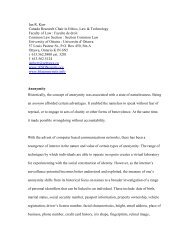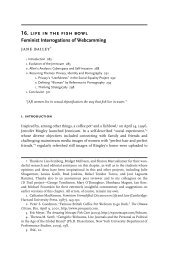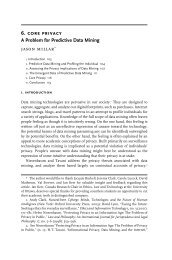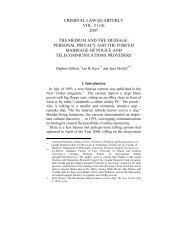Complete Cases Chart - Supreme Court of Canada - On the Identity ...
Complete Cases Chart - Supreme Court of Canada - On the Identity ...
Complete Cases Chart - Supreme Court of Canada - On the Identity ...
You also want an ePaper? Increase the reach of your titles
YUMPU automatically turns print PDFs into web optimized ePapers that Google loves.
Case Name (<strong>Court</strong>)<br />
(Judge)<br />
Location/Method <strong>of</strong> Search Relevant Statutes Issues/Holdings<br />
- (1) whe<strong>the</strong>r <strong>the</strong> search violates s. 8 <strong>of</strong> <strong>the</strong>C<strong>Chart</strong>er? - Y/N<br />
- (2) whe<strong>the</strong>r to exclude evidence by s. 24(2)? – Y/N<br />
Reasoning<br />
- (1) relevant to s.8 + CASES (Kokesch, Plant, Hunter, Tessling, Edwards)<br />
- (2) relevant to 24(2) + CASES (Collins)<br />
R. v. Benham<br />
[2003] B.C.J. No.<br />
1315<br />
Low J.A.; Donald and<br />
Newbury JJ.A. (con).<br />
*Final Level<br />
(Property search-<br />
Home<br />
Hydro/Electrical<br />
Searches) –<br />
testimony and evidence<br />
obtained from <strong>the</strong> search<br />
were not admissible against<br />
<strong>the</strong>m.<br />
- After electrical transformer<br />
malfunctions, Hydro checked<br />
<strong>the</strong> wires to Benham's home<br />
and found that he was using<br />
an excessive amount <strong>of</strong><br />
electricity.<br />
- It inspected Benham's<br />
property and found that he<br />
had installed a bypass.<br />
- <strong>On</strong> <strong>the</strong> basis <strong>of</strong> this<br />
investigation, police<br />
discovered that Benham<br />
operated a marijuana<br />
cultivation operation.<br />
- <strong>Chart</strong>er, ss. 8, 24(2);<br />
- Constitutional Question<br />
Act;<br />
- Utilities Commission Act,<br />
s. 125.<br />
- (1) Did Hydro's entry into Benham’s<br />
property constitute an unreasonable search<br />
and seizure?<br />
• NO<br />
- (2) Was <strong>the</strong> regulation that gave Hydro<br />
access to its meters and o<strong>the</strong>r equipment on<br />
customer premises unconstitutional?<br />
• NO<br />
- (3) Should <strong>the</strong> evidence be excluded?<br />
• NO<br />
- Ref. to Edwards (totality <strong>of</strong> circumstances; rights are personal and cannot be<br />
asserted by anyone except <strong>the</strong> person whose rights are violated).<br />
- (1) The relationship between Hydro and its customers was contractual and <strong>the</strong><br />
terms <strong>of</strong> <strong>the</strong> contract were dictated by statute and regulation.<br />
- (2) Hydro's equipment had to be located on customer premises and it would be<br />
commercially unrealistic for Hydro to be denied access to its own equipment.<br />
• There was also a low expectation <strong>of</strong> privacy related to Hydro personnel being on<br />
customer property.<br />
- (3) The evidence was admissible and should not be excluded pursuant to s. 24(2).<br />
• There was no breach <strong>of</strong> s. 8 and <strong>the</strong>refore no s. 24 analysis was undertaken.<br />
- Ref to Kokesch (boundaries <strong>of</strong> a perimeter search for home).<br />
- Ref to Hunter (purpose <strong>of</strong> s. 8; protection mandated by s. 8).<br />
R. v. Dunbar,<br />
Pollard, Leiding and<br />
Kravit<br />
2003 BCCA 667<br />
Finch, Braidwood,<br />
and Lowry JJ.A.<br />
* Final Level<br />
<strong>Identity</strong> – Records<br />
- The court ordered <strong>the</strong><br />
production <strong>of</strong> records held by<br />
<strong>the</strong> Law Society <strong>of</strong> B.C. to<br />
substantiate a claim <strong>of</strong><br />
incompetent counsel that<br />
formed <strong>the</strong> basis <strong>of</strong> an appeal<br />
from four persons convicted<br />
<strong>of</strong> <strong>of</strong>fences .<br />
- Note: <strong>the</strong> afterword in <strong>the</strong><br />
case admonished <strong>the</strong> lawyer<br />
representing <strong>the</strong> appellants<br />
pointing out <strong>the</strong> irony<br />
concerning incompetence.<br />
- Legal Pr<strong>of</strong>ession Act,<br />
S.B.C. 1998, c.9, s.87(5)<br />
(statutory privilege).<br />
(1) Is <strong>the</strong>re a reasonable expectation <strong>of</strong><br />
privacy in <strong>the</strong> practice records <strong>of</strong> a lawyer?<br />
• YES. There is a reasonable expectation <strong>of</strong><br />
privacy on <strong>the</strong> part both <strong>of</strong> <strong>the</strong> lawyer and<br />
<strong>of</strong> <strong>the</strong> Law Society.<br />
(2) Should <strong>the</strong> records be produced?<br />
• NO<br />
(1) Law Society records have statutory privilege.<br />
• They are not subject to <strong>the</strong> Crown’s obligation to disclose, nor are <strong>the</strong>y subject<br />
to solicitor-client privilege (where waiver <strong>of</strong> privilege renders documents<br />
compellable).<br />
• If records are not subject to Criminal Code provisions related to non-production<br />
<strong>of</strong> records for certain <strong>of</strong>fences (e.g. sexual history <strong>of</strong> complainant) <strong>the</strong>n <strong>the</strong> test<br />
in O’Connor applies “to determine when <strong>the</strong> privacy interest in confidential<br />
third party records should yield to an accused’s right to make full answer and<br />
defence.”<br />
• A number <strong>of</strong> different types <strong>of</strong> confidential third-party records will be subject to<br />
this test – including those based on statutory privilege.<br />
(2) O’Connor is a two part test:<br />
• Threshold: Are <strong>the</strong> records “likely to be relevant”? (i.e. is <strong>the</strong>re a reasonable<br />
possibility that <strong>the</strong> information is logically probative to an issue at trial or <strong>the</strong><br />
competence <strong>of</strong> a witness to testify?)<br />
• This should not be an onerous burden. It is intended to “prevent <strong>the</strong> defence<br />
from engaging in “speculative, fanciful, disruptive, unmeritorious, obstructive<br />
and time-consuming” requests for production.<br />
• –Balancing: Balance accused’s right to make full answer and defence against<br />
<strong>the</strong> privacy interests engaged, weighing salutary and deleterious effects <strong>of</strong><br />
27







